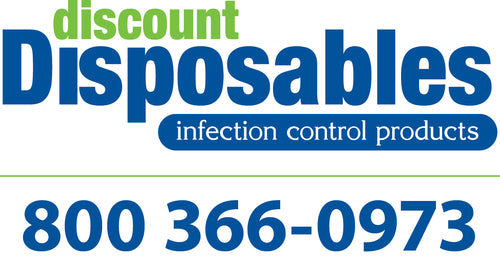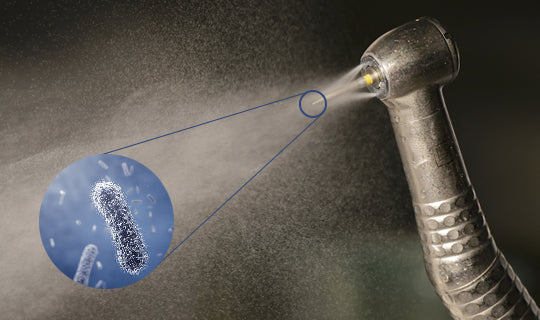Make sure this NEVER happens in your office. Find out how below.
In 2012 an elderly woman’s death was attributed to Legionnaires disease acquired during a dental procedure which used contaminated dental water. Last year, more than a dozen children suffered serious infections acquired through bacteria found in the dental office’s water. This month, at least 14 children in California were hospitalized following bacterial infections stemming from contaminated dental waterlines.
These cases show that dental unit water quality has been an ignored infection control measure for far too long. In order for a dental office to claim adherence to infection control standards, every dental office should have a process for maintaining dental unit water quality.
According to the CDC’s Guidelines for Infection Control in Dental Health-Care Settings, “Dentists […] should determine the best method for maintaining acceptable water quality (i.e., <500 CFU/mL) and the recommended frequency of monitoring”.
Research has shown that even in newly installed dental unit waterlines, biofilm and microbial counts can reach 200,000 colony-forming units (cfus) per milliliter 5 days after being installed!!
What is Biofilm?

Biofilm is any group of microorganisms in which cells stick to each other and often these cells adhere to a surface.
Research shows that dental waterlines are the breeding ground home for biofilm and biofilm provides the ideal environment for microorganisms (i.e. fungi, amoebae and bacteria) to grow. The narrow tubing promotes water stagnation and bacterial accumulation. When left untreated, or improperly maintained, biofilm and microorganisms can flow through the air/water syringe or high-speed handpieces potentially harming your patients, staff and your practice’s reputation.
This is why it’s so important to test and maintain dental unit waterlines regularly.
How to Protect Your Patients and Practice
The first step in maintaining clean dental waterlines is figuring out what the CFU levels are in your dental water lines are. Simple and inexpensive testing methods, such as the Aqua-Dent Waterline Testing Kit, provide an effective method to accurately determine CFU’s.
-
Aqua-Dent Waterline Testing Kit
 Aqua-Dent offers a reliable, easy-to-use 3rd party method to evaluate your dental water quality. Simply collect water samples in the test vials and place in the pre-paid overnight mailer. Once received, they are processed immediately. Test results are reported in actual cfu levels for each line tested, up to 30,000 cfu’s so you know how high your microbial counts are. The results are sent to you based on your preference; fax, email, or phone. Every time you test you will receive a certificate that you tested your water, and if you pass, your certificate will show that you have met or exceeded the CDC recommendations which you can proudly hang in your office!
Aqua-Dent offers a reliable, easy-to-use 3rd party method to evaluate your dental water quality. Simply collect water samples in the test vials and place in the pre-paid overnight mailer. Once received, they are processed immediately. Test results are reported in actual cfu levels for each line tested, up to 30,000 cfu’s so you know how high your microbial counts are. The results are sent to you based on your preference; fax, email, or phone. Every time you test you will receive a certificate that you tested your water, and if you pass, your certificate will show that you have met or exceeded the CDC recommendations which you can proudly hang in your office!
If the CFU levels are more than the CDC recommendation, there are a wide variety of products available for dental waterline maintenance. Things to consider when determining which waterline cleaner to use are similar other areas of infection control in your office (i.e. surface disinfection, PPE etc). You’ll need to consider things such as effectiveness, ease-of-use, and cost. Also, when waterlines are found to be contaminated, you’ll need 2 different types of cleaners: shock and maintenance. First, a shock cleaner such as Sterilex Liquid Ultra is used to remove accumulated materials. Then a maintenance cleaner is used to keep CFU levels below the recommended CDC standard.
The dental waterline maintenance cleaner that we recommend due to its ease-of-use, effectiveness, cost and low maintenance is Crossex’s Dentapure 365.
-
Crosstex Dentapure 365
 The Crosstex’s DentaPure for self contained water bottles or municipal water is EPA registered as a microbiological dental unit water purifier. Dentapure 365 provides safe dental unit water for 365 days and ensures that your practice meets or exceeds water quality of 200 CFU/mL. By simply changing the unit in accordance with its expected life cycle, and in conjunction with currently recommended practices regarding sterilization and flushing of dental instruments, DentaPure waterline cleaners will reduce bacteria in water to a level that exceed the current CDC water quality recommendations.
The Crosstex’s DentaPure for self contained water bottles or municipal water is EPA registered as a microbiological dental unit water purifier. Dentapure 365 provides safe dental unit water for 365 days and ensures that your practice meets or exceeds water quality of 200 CFU/mL. By simply changing the unit in accordance with its expected life cycle, and in conjunction with currently recommended practices regarding sterilization and flushing of dental instruments, DentaPure waterline cleaners will reduce bacteria in water to a level that exceed the current CDC water quality recommendations.
The Bottom Line
Although the risk of infection due to contaminated dental water appears to be rare, the recent hospitalization of 14 children shows that dental waterline testing and disinfection should no longer be optional. Regardless of which waterline test and cleaner you decide to use, all dental offices should monitor microbiological quality of dental unit water regularly.
Implementing infection control compliance standards, including dental waterline maintenance, shouldn’t be complicated or time consuming. Discount Disposables can assist your office with educating, implementing and maintaining infection control compliance standards. We carry a line of waterline testing and treatment products designed to easily reduce harmful biofilm at a cost-effective price.
For any questions about ordering or infection control compliance call us at 800-366-0973 or email info@ddicp.net.

